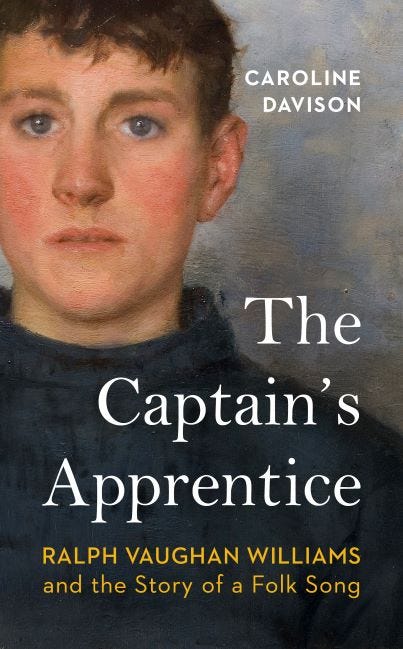Vaughan Williams’s Journey into Folk: 28 May 1904
‘As I walked out’, William Stacey, Hollycombe (near Liphook), Sussex
The singer overhears a mother and father begging their son not to go to sea, but he is determined to go, as his heart is broken.
It’s not clear how Vaughan Williams heard about William Stacey, a cowman who lived in Dog Kennel Lane, Hollycombe, in the parish of Linch, around 25 miles from Leith Hill Place. Perhaps his reputation had reached Vaughan Williams’s ears through the recommendation of another singer or through the parish church network – local vicars often proved to be good contacts for the finding of singers.
In the 1901 census Stacey, a seventy-seven-year-old widower, was categorised as a worker and probably still was when he met the composer three years later. The cowman said he used to know about fifty songs, most of which he’d learnt from his father. When he was younger, he would go ‘wassailing’ with a friend, singing outside village houses around Christmas and New Year. The composer collected five songs from Stacey and was struck by the way he used the dialect word, ‘outway’, meaning ‘very’.
The phrase ‘as I walked out’ is a common opening line in folk songs – Vaughan Williams collected another song with this title from Mr Bloomfield in Essex, but his tune and lyrics were very different, more often known as ‘The Old Garden Gate’. It was that song, not Stacey’s, that the composer used as a theme in his Nocturne and Scherzo of 1906.
Stacey’s ‘As I walked out’ song tells the story of a mother and father begging their son not to go to sea to fight for the king, but he is determined to take his chances because his true love has gone off with another man. The words, hastily scribbled down by Vaughan Williams, seem to include elements of a better-known song ‘Our captain calls’ with its inclusion of the line ‘Our captain calls all hands on board all for to sail away’: in the better-known song it’s usually a girlfriend who begs the man to stay.
The lyrics of another song, ‘Our General Bold Captain’, published in the Journal of the Folk Song Society (1901) bear a closer resemblance to Stacey’s version: here it is the father that begs his son not to go to the West Indies and fight for the king – a variant of the line ‘Let King George’s crown be pulled down, don’t you face his enemies’ is in both songs – but, as with Stacey’s song, the son’s true love has left him for another, and he won’t stay. ‘Our General Bold Captain’ was collected by W.P Merrick at the turn of the 19th century in Lodsworth, about 8 miles southeast of Stacey’s village, and Vaughan Williams collected another version of the song a few months later from the Verralls at nearby Horsham - so it seems that the song was doing the rounds in Sussex at the time.
Nothing is simple though – the melodies were not the same: the Lodsworth melody is a variant of a well-known tune often known as ‘Lazarus’ (think ‘Star of the County Down’); the melody sung by Stacey and the Verralls is more obscure. There is some continuity in the words being shared in the area, but the melody was being picked by each singer.
The beginning of Stacey’s tune is similar in character to ‘The Ploughboy’s Dream’ [see 25 December 1903] in its major scale and melodic shape, but then develops into a modal key with a flattened 7th – in this case, F natural instead of F#. The phrase, ‘Twas betwixt a mother and her son, I overhead her say’, sounds remarkably ‘bluesy’, before passing quickly back into the G major key with reinstatement of the F#. I did wonder whether Vaughan Williams omitted by mistake the natural sign on the ‘F’ in the penultimate phrase - but I’ve sung it as it was written.
Vaughan Williams Memorial Library link: https://www.vwml.org/record/RVW2/2/113
Roud No. 23270 [see also RN2752]
Next post: 23 June




